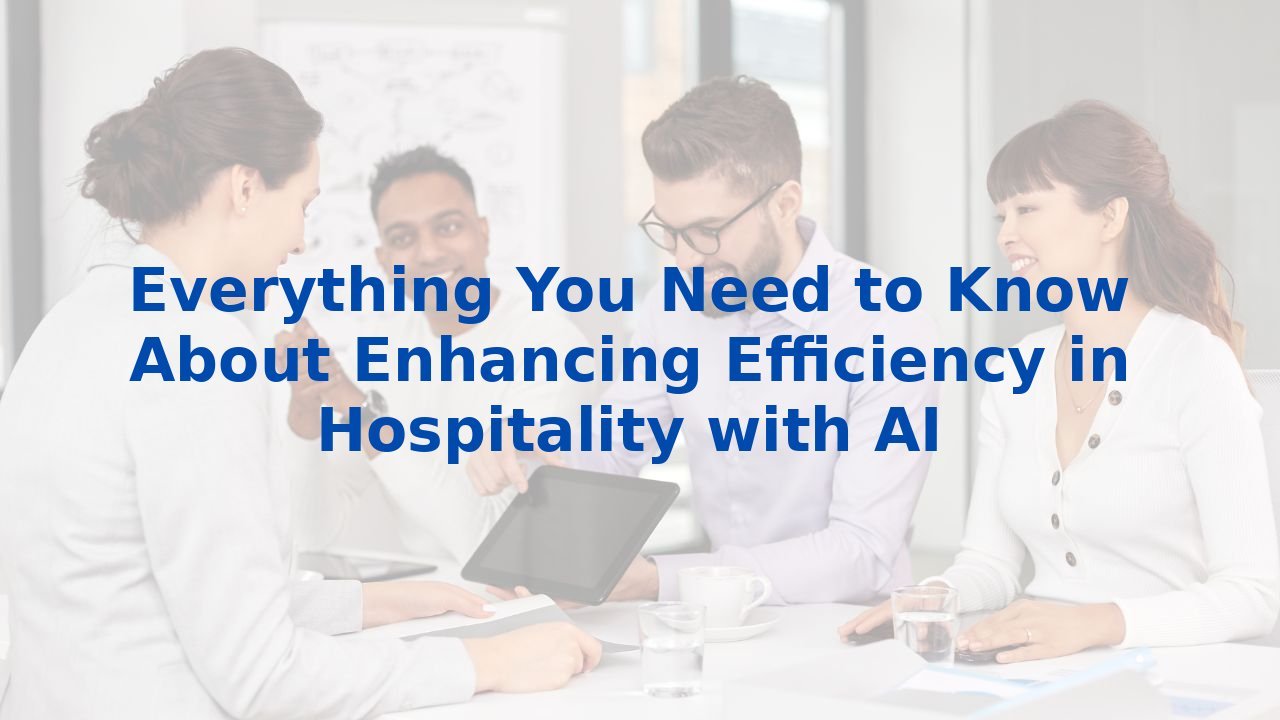Everything You Need to Know About Enhancing Efficiency in Hospitality with AI
Everything You Need to Know About Enhancing Efficiency in Hospitality with AI
Introduction
In today's fast-paced hospitality environment, efficiency isn't merely an advantage; it's a necessity. As competition grows and customer expectations skyrocket, businesses in the hospitality sector must adapt and evolve. Enter artificial intelligence (AI)—a transformative technology with the potential to reshape operations, enhance productivity, and ultimately create memorable experiences for guests. This post explores how AI can revolutionize key processes within the hospitality industry, amplifying efficiency and performance.
1. Automating Routine Tasks
Imagine a world where routine tasks—such as booking confirmation, invoice processing, and customer inquiries—are handled seamlessly by intelligent systems. AI can bring this vision to life. By automating these repetitive tasks, organizations can reduce human error, speed up service, and reallocate valuable human resources to more strategic roles. This not only makes operations smoother but also empowers employees to focus on creativity and innovation at the heart of hospitality.
2. Process Optimization
AI's analytical capabilities allow hotels and restaurants to assess their workflows and detect inefficiencies. By scrutinizing data for bottlenecks and redundancies, organizations can optimize service delivery. For instance, understanding peak hours through data analysis can help staff schedule appropriately, ensuring that guests receive timely service. This streamlining of processes contributes to a cost-effective and responsive operational approach.
3. Enhancing Customer Experience
In an industry defined by customer satisfaction, AI serves as a powerful tool for delivering exceptional service. Intelligent chatbots can manage a multitude of customer inquiries at once, ensuring responses are both immediate and accurate. When complex issues arise, human staff can be freed up to handle them, guaranteeing that customers receive the highest level of care when it matters most. This responsiveness not only delights guests but fosters loyalty, paving the way for repeat business.
4. Improving Decision-Making
AI's ability to analyze large sets of data can significantly improve decision-making processes within hospitality organizations. AI systems can interpret consumer preferences and trends, guiding managers in crafting innovative offerings. Whether it’s adjusting pricing strategies in response to demand fluctuations or identifying potential new markets, the insights gained from AI guarantee that decisions are informed, timely, and effective.
5. Ensuring Safety and Compliance
Safety is of utmost importance in the hospitality industry, both for guests and employees. AI can play a crucial role in monitoring and enhancing safety measures in real-time. For example, AI can analyze data from various sources to detect anomalies—like identifying when a fire alarm system may be malfunctioning or monitoring employee fatigue to prevent accidents. By incorporating AI into safety protocols, organizations can protect both their guests and their workforce.
6. Increasing Reliability and Accuracy
In hospitality, reliability and accuracy are paramount. AI minimizes human errors that often arise from data entry and scheduling mistakes. Automating reservations and inventory management not only improves accuracy but also ensures that operations run smoothly. Through predictive analytics, businesses can anticipate needs, streamline services, and enhance the overall guest experience. This leads to a dependable service that guests can trust.
7. Boosting Productivity
Generative AI is ushering in an era of unprecedented productivity. Studies indicate that users who leverage AI tools can handle significantly more tasks without compromising quality. In hospitality contexts, support teams and front desk personnel can engage with more guests simultaneously, ensuring efficient service delivery without feeling overwhelmed. Such productivity gains redefine what is possible within a confined schedule, utilizing technology to its fullest potential.
8. Bridging Skill Gaps
One of the often-overlooked benefits of AI is its capacity to bridge skill gaps within teams. While AI automates routine tasks, it frees up employees to engage in more complex responsibilities—nurturing their skill sets and enhancing their capabilities. Training initiatives that focus on AI literacy can empower hospitality teams to harness this technology effectively, allowing them to provide more value to their roles.
9. Investing in AI Training for Employees
A successful integration of AI in hospitality requires more than technology—it demands human expertise. Organizations must prioritize employee training to equip their teams with the skills needed to thrive alongside AI. Emphasizing the importance of understanding AI tools sparks enthusiasm and innovation among staff. Investing in comprehensive training programs not only amplifies productivity but also cultivates a culture of continuous learning and adaptability.
Conclusion
Embracing AI in hospitality is not just an option; it’s a strategic necessity. From automating routine tasks and optimizing workflows to enhancing customer experiences and improving decision-making, AI can catalyze extraordinary shifts in efficiency. As the industry continues to evolve, organizations that prioritize technology integration and invest in employee training will not only stay competitive but redefine excellence in hospitality. The future is bright—let's welcome it with open arms. For organizations looking to kick-start their AI journey, explore our [Complete AI Training](https://completeaitraining.com/) resources to equip your team with the skills they need for success in this new era.



